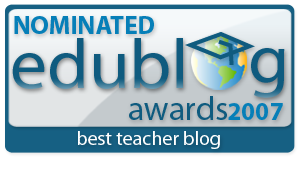Blogging started for me as a way to document a year living overseas, and although many serious bloggers sneer at the idea of using a blog for something as lowly as a simple travel diary, I found it a wonderful jumpoff point into the wider world of blogging. Not only do I now have a permanent record of a wonderful year in Canada, but that blog got me into the habit of writing regularly. And really, getting into a habit is an important part of the whole blogging experience. I guess, I’m writing this now because I hadn’t written a post for a few days and I was starting to think that I needed to! Not for you. For me. This blogging thing has become an integral part of who I am, and when I go for a few days without writing it just doesn’t feel right.
But the habit is not just about writing, it’s about thinking. It’s about engaging with ideas that you read on other blogs, or through listening to podcasts, or even from trawling through Twitter posts. It’s about simply not being able to let that river of ideas flow past you without having to respond in some way. I can’t imagine being exposed to this rich smorgasbord of ideas without having some reaction to them, and responding via a blog seems like such a natural thing to do. It’s definitely about the thinking and not the writing… (in fact if you only knew what a lousy typist I am, you’d realise that the actual writing is a real pain!)
So I blog. I can’t help myself.
What’s become really interesting though is the environment that the blogging habit exposes you to. Without realising it, I look at my feedreader these days and it amazes me just who I have been inviting into my world, and even more amazingly, who has been inviting me into theirs. Browsing through my Skype contact list is like a who’s who of incredible educators from all around the world. My Twitter feed is a rich tapestry of deep thoughts, trivial chatter and personal relationships, but it’s engaging me with these constant ideas about learning, teaching and the relationships we form with kids in our classrooms.
Having just gone through the process of applying for another job, it really struck me just how much my online world has contributed to who I am as an educator. I don’t have a string of letters after my name, in fact I’m not even teaching in the same discipline as I was originally trained. I’ve occasionally considered going back to university, doing some further study and becoming a bit more learned, but I look at the idea factory surrounding me and can’t seem to justify the time and cost involved… and although I’m not sure how I’d ask the question, I suspect my new school saw enough of this world reflected in my interview that it played a big part in them offering me the position.
I did go back to university a few years ago to do part of a masters course in educational technology. It was a good experience, and forced me to start reading literature about learning that I wouldn’t have done otherwise – Negroponte, Papert, Stoll, Cuban, Spender, etc – all names that I had never even heard before despite having been a teacher for many years. It was this exposure to ideas that flipped switches in my head and caused me to rethink a few things about school and learning. And it made me realise that many teachers never do this sort of thing at all. Try going to work on Monday and when your colleagues ask what you did on the weekend, tell then you went to an education conference (in your own time!) or read a book about learning theory, or chatted with other teachers about how to make learning more relevant, and see the sorts of odd looks you get, or the sarcastic “gee that must have been fun!” comments.
The thing is, I don’t mind learning. In fact I can’t imagine not learning. And exposure to this stream of ideas and thoughts and opinions is quite possibly the best environment for learning I’ve ever come across.
So maybe that makes me dysfunctional or just plain boring, but I really do enjoy the feeling of being stretched by new ideas all the time. I don’t like to be the same today as I was yesterday, I want to be growing all the time. And one of the most rewarding and amazing ways of getting that constant stream of brain food is through the blogging and the writing and the reading and the podcasting and the sharing and the conversing with other people who I think are some of the smartest, brightest, cleverest people I know.
Tags: blogging, pln, pd
 Wow… I looked in my email today and there was a note saying that Betchablog has been nominated for a 2007 Edublog Award in the category of Best Teacher Blog. I think there are probably a whole lot of teacher blogs that are a whole lot better than anything I could do, but I’ve still had a big smile on my face all afternoon!
Wow… I looked in my email today and there was a note saying that Betchablog has been nominated for a 2007 Edublog Award in the category of Best Teacher Blog. I think there are probably a whole lot of teacher blogs that are a whole lot better than anything I could do, but I’ve still had a big smile on my face all afternoon!